Law firm PPC advertising strategies of the past have become increasingly less effective over the last decade. Gone are the days of firms relying exclusively on radio, television, and the Yellow Pages for their leads. Today, if your advertising strategy doesn’t include a heavy dose of PPC, you’re missing out on a big piece of the pie.
In a recent Martindale-Avvo study, 43% of the consumers surveyed said they rely on Google when looking for a lawyer, while just 14% said they were influenced by print, radio, or television advertising.
By now, most lawyers are aware of this trend and have responded with a significant investment in PPC advertising. Yet, only a small percentage have managed to have sustained success, and that’s not surprising… The market is extremely competitive.
We’re talking Harvard Law competitive here!

Navigating this minefield is tough. There are many reasons why lawyers, and the advertising agencies they hire, fail to find success with law firm PPC.
After auditing more than 300 advertising accounts for law firms over the last 8 years, we’ve seen it all. But mostly what we’ve seen are the same mistakes and missed opportunities happening time and time again.
Check out our case studies for a few examples.
If you’re struggling to get results, chances are you’re making some of the same mistakes. To help get you on the path to positive ROI, we’ve put together a list of the 8 most impactful changes you can make to your law firm PPC strategy today.
1. You’re Targeting Generic Keywords
When we audit law firm PPC accounts, one of the most common mistakes we see is broad/generic keyword targeting. And it’s a costly one. Law keywords fetch some of the highest CPC’s in all of paid search advertising.
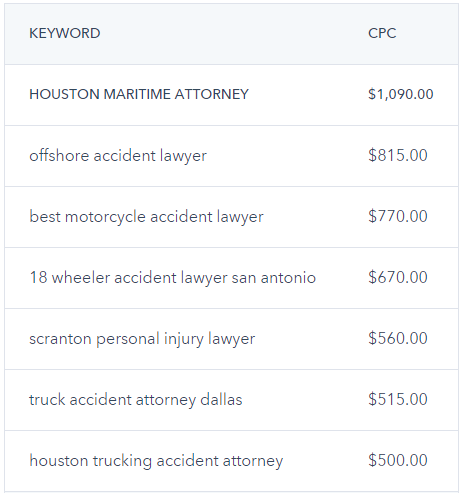
By broad/generic keywords we mean terms such as [lawyer] or [attorney]. These types of queries tell you nothing about the type of lawyer the person is looking for, and you certainly don’t want to pay $50 or $100 per click to find out.
On top of that, these keywords have a much higher search volume, which can eat up your budget quickly.
Adding a location modifier to the keyword doesn’t help much either. Searches like [lawyer near me] or [los angeles attorney] still don’t tell us anything about the type of legal issue the person has.
Solution: Narrow your focus
Most firms specialize in just a few practice areas. Some are even focused on just one (personal injury, bankruptcy, divorce, etc).
The core of your search campaigns should be built around keywords that are directly related to the types of cases your firm wants. Those keywords will have the highest likelihood of converting into leads, and ultimately, paying clients.
2. You’re Bidding Too High After Hours
Two big factors make your after-hours leads less valuable than the ones that come in during normal business hours.
First, most people are in research mode after hours. They don’t expect to be able to reach anyone until the next business day, so they often don’t convert into a lead right away. They may take your information down and reach out to you during business hours, or they may not.
This translates to lower conversion rates, which means it takes more clicks to generate a lead after hours. By reducing your bids, you can mitigate that conversion dip and keep your cost per lead on par with where it is during business hours.
Second, when clicks do convert into leads after hours the phone calls are generally going to an answering service. Don’t get me wrong, answering services are better than voicemail, but they are far from an attorney or even office receptionist answering the phone.
You don’t want to pay the same amount for leads that you or your team aren’t making the first contact with.
Solution: Start day-parting
Creating an ad schedule and making time-based bid adjustments is a PPC best practice for any account. For law firms, this is especially important.
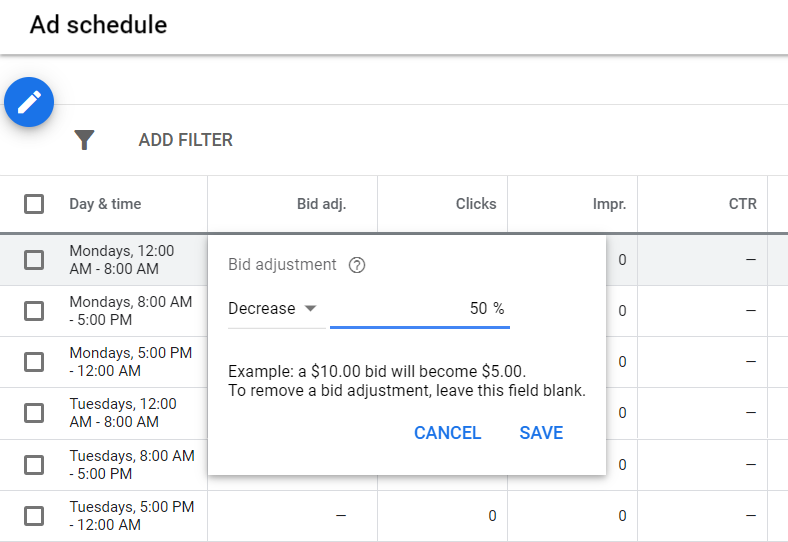
We recommend breaking your ad schedule up into 3 segments:
- Normal business hours (No bid adjustment) – These are the hours that you and your staff are normally in the office and available to answer the phone.
- Evening and weekend hours (-25% to -50% bid adjustment) – These hours generally run from the close of business until 10 or 11 pm on weekdays, and all day on the weekends. If you have an answering service, tailor these hours to when they’re available and consider making a bid adjustment on the lower end of this range.
- The twilight zone (-50% to -100% bid adjustment) – After 11 pm, most people are asleep. And those who aren’t are still awake and searching for a lawyer are most likely just casually browsing. They don’t expect to be able to contact you during these hours, and therefore they probably won’t even attempt to.
3. You’re Location Targeting is Too Broad
You may be licensed to practice law statewide, or even in several states, but most clients are looking for a lawyer within 30 miles of them. In fact, only 25% of consumers say they would travel more than 30 miles to meet with a lawyer.
Solution: Target a 30-mile radius
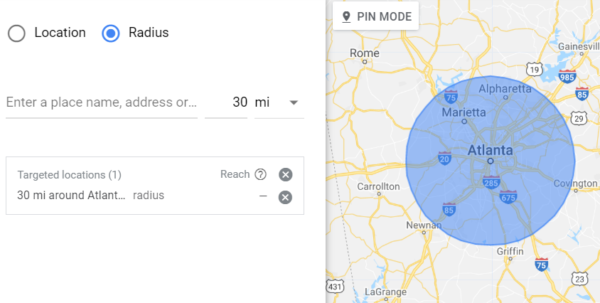
Keep in mind, the 30-mile radius is a general rule of thumb. It’s the average distance most people are willing to drive to meet with a lawyer. Ultimately you should let geography guide your decision. If you’re in an area where the next closest city is more than 30 miles away, it makes sense to expand your targeting.
If you do choose to stretch your reach further, I would highly recommend reducing bids for cities and zip codes that fall outside of the 30-mile radius.
4. You’re Not Stealing Leads From Your Competitors
Studies have shown that 75% of consumers contact more than one attorney before deciding who to hire. Not even referrals are exempt from heavy vetting, as just 41% of consumers reported hiring the attorney that was referred to them.
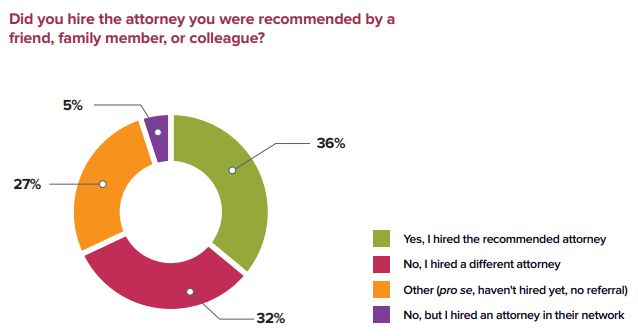
Source: Martindale-Avvo
What this boils down to is that people show little brand loyalty when it comes to hiring an attorney.
So how do you capitalize on this with law firm PPC advertising? Competitor campaigns.
Solution: Build a competitor campaign
Picture this…a prospective client is introduced to one of your competitors through a radio or tv ad, a billboard, or maybe even a referral. They do a Google search for this competitor’s name to learn more about them, and the first result that pops up is an ad for your firm. You hit them with a killer headline that they are compelled to click on, and boom, they’re in your marketing funnel now!
If they like what they see on your site, they may forget all about the competitor and give you a call first.
Best of all, these clicks are super-cheap; we’re talking pennies on the dollar compared to your core keywords. Even if you only land one client out of every hundred clicks from your competitor campaign you’re still way ahead of the game.
5. You’re Breaking The 5 Minute Rule
A study by Lead Response Management suggests that waiting more than 5 minutes to respond to a lead reduces your chances of making contact by 100 times. That’s huge!
When it comes to lead generation, phone calls are the golden goose for this very reason. As long as you’re answering the phone, calls are always going to convert best.
It’s email leads that most firms struggle to respond to promptly. Shockingly, it takes the average law firm three or more days to respond to an email lead 42% of the time. Three days is an eternity in today’s fast-moving marketplace, and slow response time is the #1 reason why people choose not to hire a lawyer.
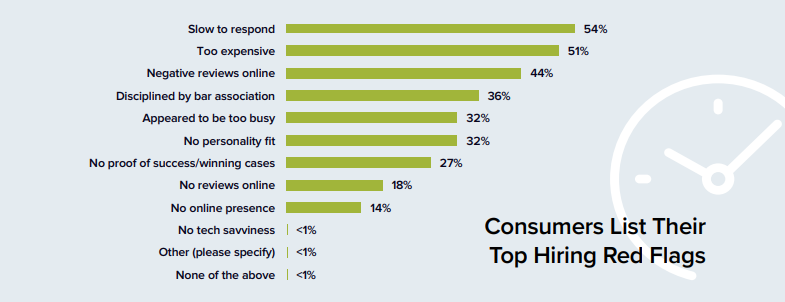
It takes the average law firm three or more days to respond to a lead 42% of the time. Three days is an eternity in today’s fast-moving marketplace. You’re effectively throwing 42% of your (very expensive) leads in the trash.
Solution: Appointment scheduling software
For a busy firm, following up on email leads is a pain. It’s hard to be consistent and even harder to scale. But fortunately, there is a magic bullet for this problem: appointment scheduling software.
Using software such as Calendly, you can embed a calendar on your website that allows newly captured leads to book an appointment with you right away. This cuts the hassle of following up out of the picture and turns a form lead into what you wanted in the first place, a phone call.
Pro tip: We have found that we get the best results when embedding a calendar on the thank you/confirmation page. This is the page a visitor is redirected to after they fill out a form on your website or landing page.
6. You’re Not Connecting With Your Audience
The truth is, many people are intimidated by lawyers. And while that might be an advantage in the courtroom, it can have a negative impact when it comes to winning over new clients. This is especially true for younger generations.
A sterile-looking website full of stock photos is not going to resonate well.
Solution: Use video to build a connection
Videos are powerful. They can tell a story and build connections in a way that words and images can’t.
Investing in a professionally-produced video is one of the best moves you can make for your law firm’s marketing strategy. The video can be used on your website, landing pages, social media, and in remarketing campaigns.
If you’re not ready to invest in a professional video, a simple self-made video can still yield powerful results.
7. You’re Sending Ads to Your Website
You may have a beautiful website, but even the best websites can’t compete with a well-designed landing page when it comes to converting paid traffic into leads.
Given how expensive CPC’s are for law firm PPC advertisers, even a 10% lift in conversion rate can mean thousands of dollars saved and hundreds of additional leads per year.
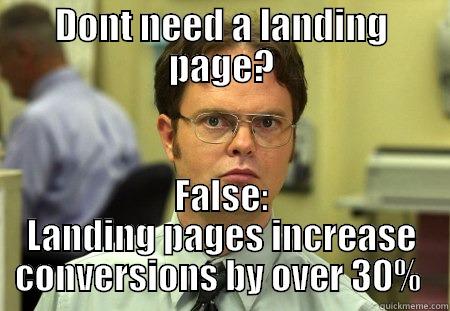
Solution: Use landing pages
The idea behind a landing page is simple…strip out all of the unnecessary noise and distractions you’d find on a full website and get right to the point…and the point, in this case, is lead generation.
This means trading eye-glazing walls of text and distracting menu navigation in favor of focused headlines, powerful images, and clear calls to action. It also means testing every little facet of the design until you’ve molded your landing page into a conversion machine.
This process is known as conversion rate optimization, and it essential to squeeze every last drop of ROI out of your campaigns. It’s a lot of work but the ends are more than worth the means.
8. You’re Sleeping on Bing (Microsoft Ads)
Google’s little brother is often an afterthought when it comes to paid search, but it shouldn’t be. Bing’s demographics and lower competition make it a perfect fit for law firms.
Sure, the search volume is only a fraction of Google’s, but less competition means CPC’s are often less than half of what’d pay on Google. Bing’s user base is also older and more affluent. What’s not to like about that?
Solution: Import your campaigns into Microsoft Ads
Once you’ve refined your strategy on Google Ads, you should start looking at Microsoft Ads as a way to scale up your paid search strategy on Bing. With Microsoft Ads’ import feature, getting your Google campaigns transferred over is pretty simple.
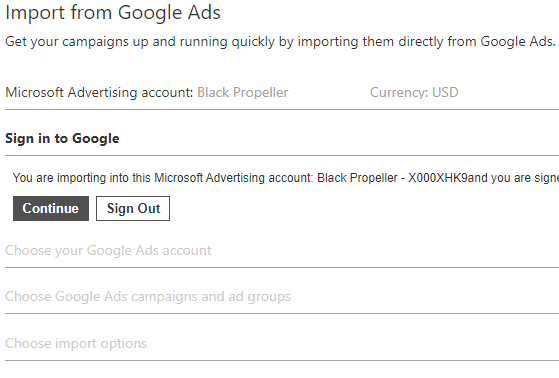
9. Click Fraud Is Eating Up Your Budget
Have I mentioned that law PPC is extremely competitive? Perhaps I have a time or two, but it bears repeating again. And let’s face it…where there’s stiff competition, there’s often someone (or two) willing to cheat to get an edge. We know you’d never stoop that level, but you can bet that at last one of your competitors is.
How do they cheat? They eat up your budget by clicking on your ads or having their associates do it for them. Some even go as far as to hire companies to do their dirty work for them. Make no mistake, click fraud is rampant in the law firm PPC market.
The good news is Google has gotten very good at catching this type of fraudulent activity and helps to mitigate the damage to some extent. But Google’s fraud protection only goes so far. Those who are willing to take their cheating to another level by rotating IP addresses and hiding behind VPN’s can often evade Google’s measures.
To combat this issue for our clients we use click fraud software such as Click Cease. This software super-powerful and can almost completely eliminate click fraud when used properly. The amount of wasted ad spend we save for our clients every month is unreal. If you’re not using click fraud software to protect your campaigns, you are undoubtedly throwing a lot of money away.
Bonus Strategy: Double-Dip With Search Remarketing
Remember those generic keywords we mentioned earlier that were a big no-no? Well, we’ve got a strategy to incorporate them effectively. We call it the “double-dip.”
Let’s say a prospective client does a Google search for one of your core keywords. For example, we’ll assume you are a personal injury firm and the search was for “personal injury lawyers.” Your ad pops up and they click on. They browse your site for a bit and they’re either not ready or not sufficiently convinced to reach out to you just yet, so they bounce.
A few days pass and they haven’t yet chosen an attorney, so they go back to Google and search again. This time they simply decide to search the generic term [lawyers near me] with no mention of personal injury.
Normally you wouldn’t want to show up for this search, but in this case you do, since this user has already shown an interest in one of your core keywords. By applying a remarketing list to your search campaign you can safely advertise for generic keywords because the audience is already pre-qualified.

This works for what we call top-of-funnel searches too. These are searches that are more research-based than intent-driven. Some examples for a personal injury firm might be “what does premises liability mean” or “what are my chances of winning a slip and fall case.”
You wouldn’t normally want to show ads for these types of searches to a cold audience. But if they’ve shown an interest in your firm already (warm audience), then it’s time to double-dip!
Conclusion
When you’re throwing around $50+ per click, things can get scary pretty quickly. A few down days in a row can leave you questioning whether or not law firm PPC advertising is worth it.
Believe me, it is.
If you’re not currently getting the results you’d hoped for out of your campaigns, these 8 tips are a great place to start your turnaround.
With the right strategy in place, law firm PPC can be a predictable and scalable source of new business for your firm.




